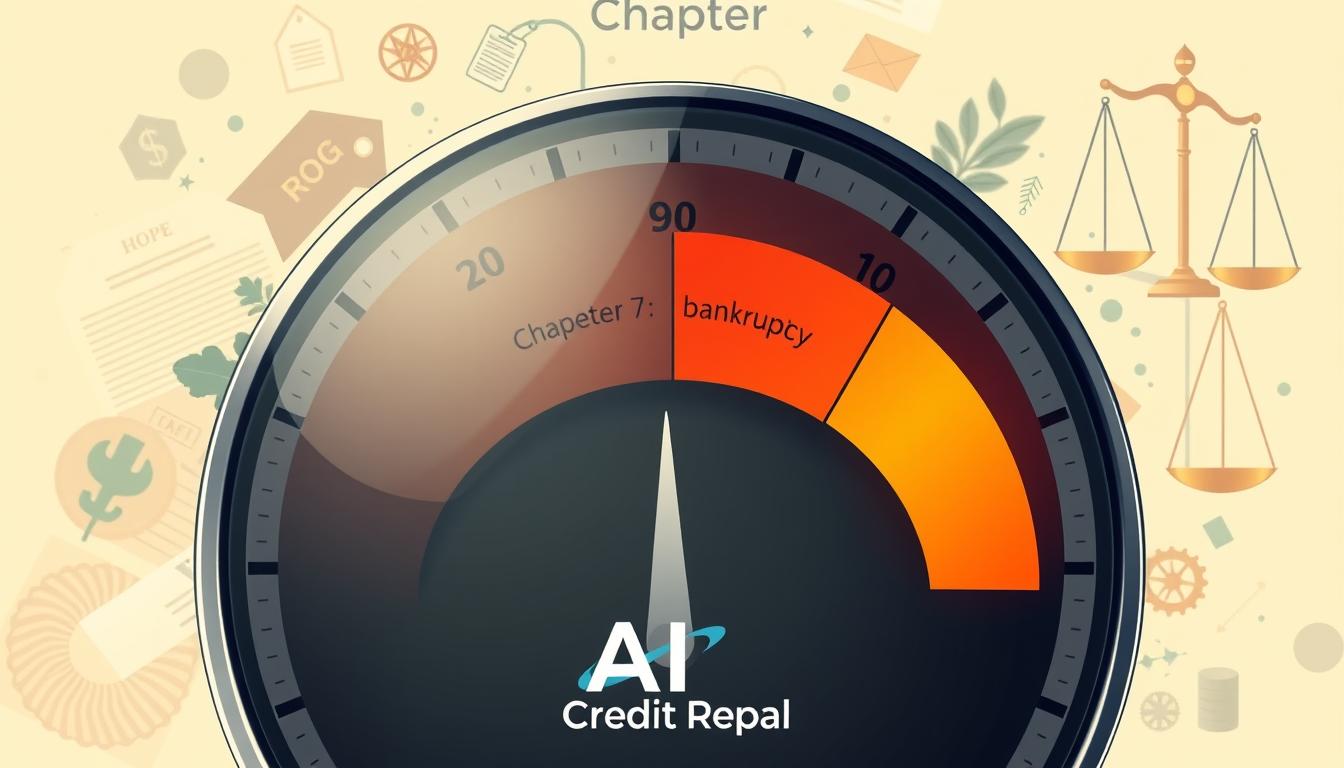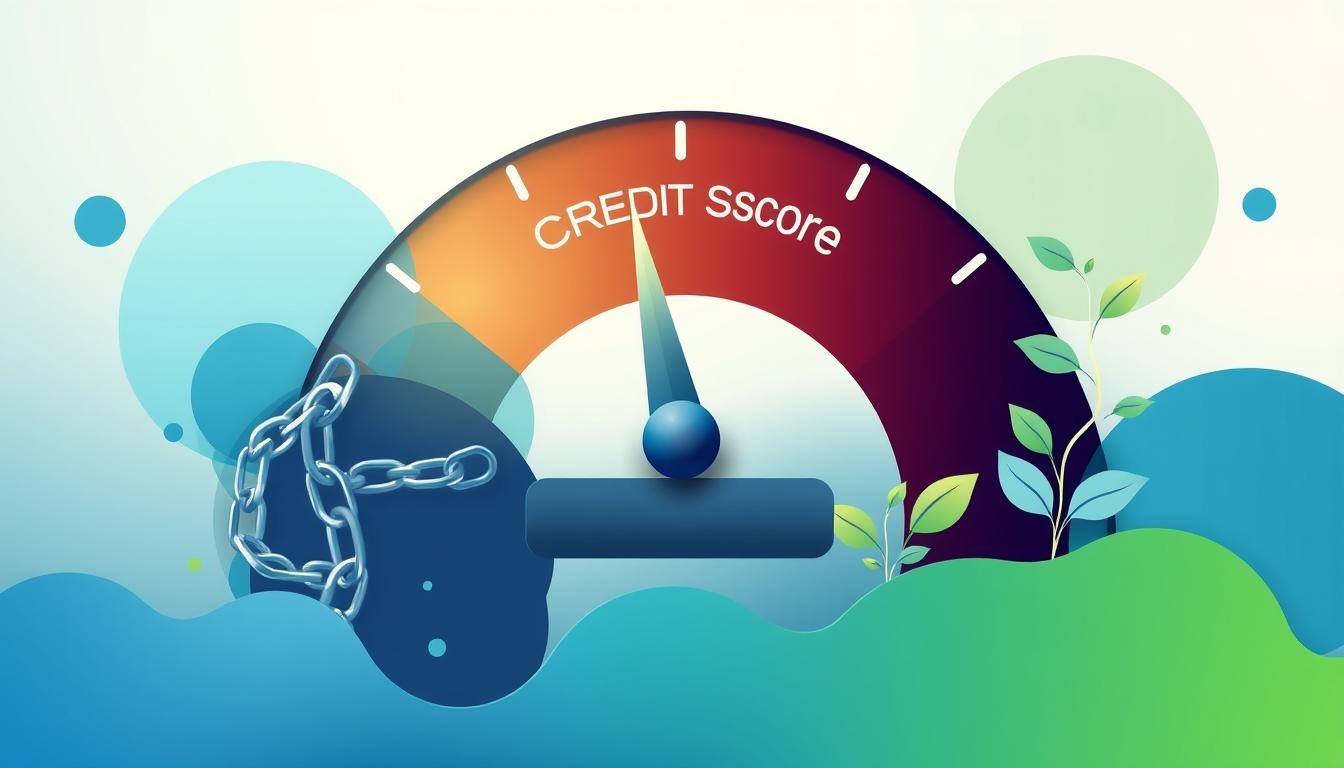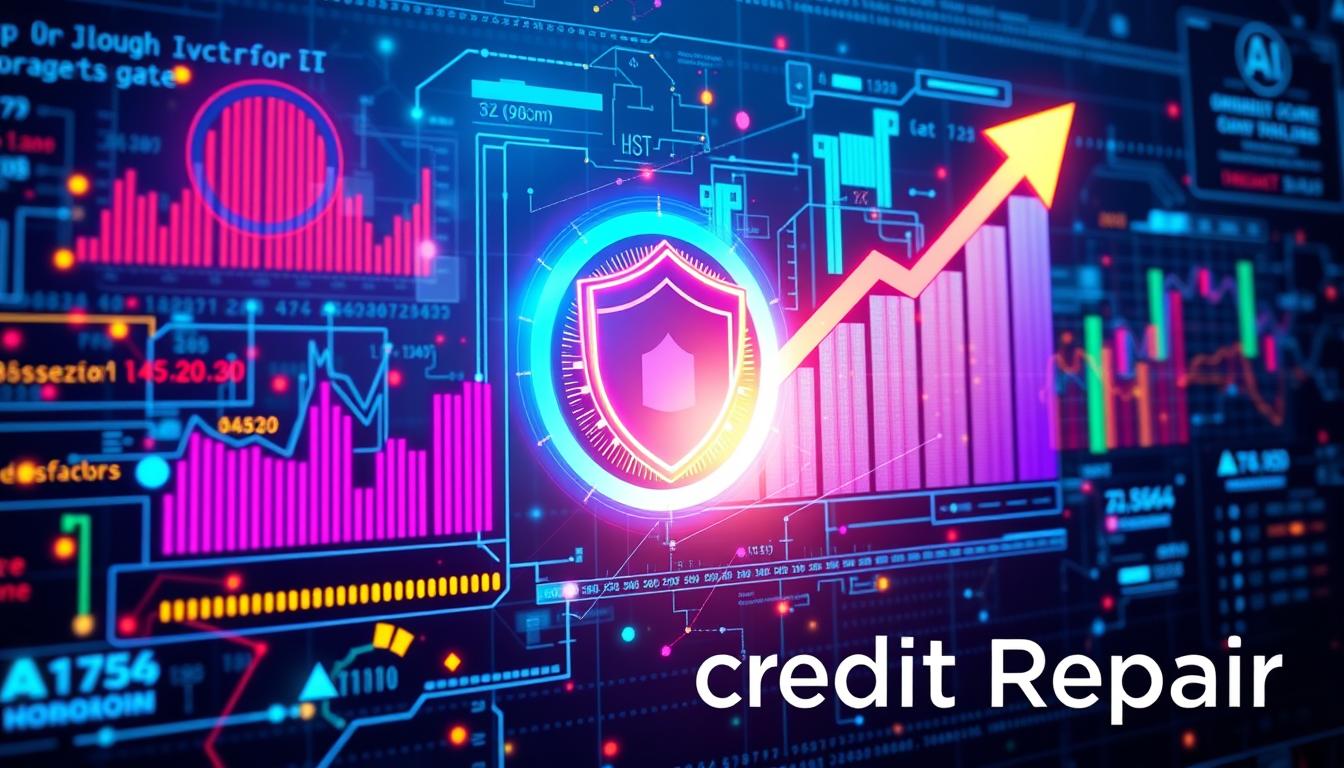Chapter 7 bankruptcy can greatly affect your credit score. It’s vital to know how this process impacts your financial standing. This knowledge helps you rebuild your credit effectively.
We’ll explore bankruptcy’s effect on credit scores. We’ll also discuss steps to improve your creditworthiness. Lastly, we’ll look at the timeline for credit recovery.
Key Takeaways
- Chapter 7 bankruptcy can cause a significant drop in your credit score, often by 150 to 300 points.
- Your credit score after Chapter 7 can range from the low 500s to the high 600s, depending on various factors.
- Rebuilding your credit after bankruptcy requires establishing new credit accounts, maintaining good payment history, and monitoring your credit report.
- It typically takes 12 to 24 months to see a substantial improvement in your credit score after filing for Chapter 7 bankruptcy.
- Understanding the credit score models and calculations can help you develop a strategic plan for credit score recovery.
Understand the Impact of Chapter 7 Bankruptcy on Your Credit
Chapter 7 bankruptcy can severely damage your credit score. It stays on your credit report for up to 10 years. This signals to lenders that you’ve faced financial troubles.
Rebuilding your financial standing requires understanding bankruptcy’s effects. It’s crucial to know how it impacts your credit score. Maintaining a good credit score is key to recovery.
How Bankruptcy Affects Credit Scores
Filing for Chapter 7 bankruptcy can drop your credit score by 200 points or more. This steep decline results from negative information on your credit report. It includes the bankruptcy and any missed payments before filing.
Lenders see bankruptcy as a high-risk indicator. This makes getting new credit or good interest rates tough.
The Importance of Credit Scores
Your credit score is vital for loans, credit cards, housing, and even jobs. A low score makes qualifying for financing difficult. If you do qualify, you may face higher rates and unfavorable terms.
A good credit score is essential for financial stability. It’s key to reaching your long-term goals.
| Credit Score Range | Impact on Borrowing |
|---|---|
| 800-850 | Excellent credit, typically eligible for the best interest rates and terms |
| 700-799 | Good credit, can qualify for favorable financing options |
| 600-699 | Fair credit, may face higher interest rates and limited credit options |
| 500-599 | Poor credit, likely to have difficulty obtaining credit or financing |
| 400-499 | Very poor credit, severe limitations in accessing credit and financing |
Understanding bankruptcy’s impact on your credit score is crucial. It helps you take steps to rebuild your financial standing. This knowledge can help you regain access to credit and financing options.
Your Credit Score Immediately After Filing for Chapter 7
Filing for Chapter 7 bankruptcy can cause your credit score to plummet. It often drops by 200 points or more. This happens because the filing appears on your credit report.
The credit score after filing for chapter 7 is typically much lower than before. Bankruptcy is a severe negative mark on your credit history. The credit score impact of chapter 7 bankruptcy is substantial and long-lasting.
Chapter 7 bankruptcy affects your credit score immediately. It can have long-lasting consequences on your financial life. Lenders see bankruptcy as a sign of financial distress.
This can make it harder to get new credit or loans. Even renting housing might become more challenging.
“The impact of a Chapter 7 bankruptcy on your credit score can be devastating, often causing a drop of 200 points or more. It’s crucial to be prepared for this immediate effect and to start rebuilding your credit as soon as possible.”
Understanding the credit score after filing for chapter 7 is crucial. It helps you prepare for future challenges. You can then take steps to rebuild your credit over time.

Rebuilding Your Credit Score After Bankruptcy
Rebuilding credit after Chapter 7 bankruptcy is crucial for financial stability. The process involves setting up new credit accounts and keeping up with payments. By following these steps, you can improve your credit score over time.
Establishing New Credit Accounts
Opening new credit accounts is vital for rebuilding credit after bankruptcy. Options include secured credit cards, credit-builder loans, or becoming an authorized user. These accounts help you show responsible credit behavior and build your credit history.
Maintaining Good Payment History
Consistent on-time payments are key to rebuilding credit after how to rebuild credit after chapter 7. Pay all bills, including utilities and rent, on time every month. This shows lenders you’re committed to responsible credit management.
| Credit Rebuilding Strategies | Potential Benefits |
|---|---|
| Secured Credit Card | Helps establish new credit, reports to all major credit bureaus |
| Credit-Builder Loan | Builds credit history, reports to all major credit bureaus |
| Becoming an Authorized User | Piggybacks on someone else’s credit history, can improve maintaining good payment history after bankruptcy |
Using these strategies and showing responsible credit behavior will help rebuild your credit score. Over time, you’ll regain control of your financial future.
What Is Your Credit Score After Chapter 7?
Filing for Chapter 7 bankruptcy can severely impact your credit score. Your score may drop to the poor or fair credit range (below 670). This significant decline results from the bankruptcy filing’s negative effect on your credit history.
The average credit score after chapter 7 bankruptcy typically falls between 500 and 600. This means your credit score will likely be much lower than before the bankruptcy proceedings.
| Credit Score Range | Credit Quality |
|---|---|
| 800-850 | Excellent |
| 740-799 | Good |
| 670-739 | Fair |
| 580-669 | Poor |
| 500-579 | Very Poor |
Your post-bankruptcy credit score depends on your unique financial situation. It also considers your credit history before filing. The general trend shows a major decrease in your credit score.
This leaves you with the task of rebuilding and improving your credit over time. It may take years, but it’s possible to recover with effort and patience.

“The road to rebuilding your credit after bankruptcy can be long, but it’s not impossible. With discipline and persistence, you can regain your financial footing and work towards a brighter financial future.”
Factors That Influence Credit Score Recovery
Your credit score recovery after Chapter 7 bankruptcy depends on several factors. Two key aspects are your credit history length and the types of credit accounts you have.
Length of Credit History
A longer credit history helps speed up credit score recovery. Lenders can assess your past behavior over a more extended period. This gives them a better understanding of your financial habits.
People with longer credit histories often find it easier to rebuild their creditworthiness. They have more data to show lenders their financial responsibility.
Types of Credit Accounts
Your mix of credit accounts affects credit score recovery after bankruptcy. A diverse portfolio shows you can manage different types of credit responsibly.
This variety includes credit cards, loans, and other financing options. It demonstrates your ability to handle various financial obligations.
Understanding these factors helps you develop a plan to rebuild credit. Consistent payments and a diverse credit mix are crucial for regaining financial stability.
| Factor | Impact on Credit Score Recovery |
|---|---|
| Length of Credit History | Longer credit history leads to faster credit score recovery |
| Types of Credit Accounts | Maintaining a diverse credit mix helps improve creditworthiness |
Monitoring Your Credit Report After Bankruptcy
After filing for Chapter 7 bankruptcy, keep a close eye on your credit report. Regular checks ensure accuracy and help identify errors affecting your credit score. This practice is vital for rebuilding your financial standing.
By monitoring your report, you can spot changes and issues quickly. This allows you to take swift action to improve your credit situation.
Tips for Monitoring Your Credit Report
- Request a free copy of your credit report from each of the three major credit bureaus (Experian, Equifax, and TransUnion) annually.
- Review your credit report carefully for any errors or inaccuracies, such as incorrect account information, incorrect payment history, or erroneous bankruptcy filings.
- Dispute any errors or inaccuracies you find with the credit bureaus, providing supporting documentation as needed.
- Monitor your credit report for any changes or updates, such as new accounts being opened or old accounts being closed.
- Consider enrolling in a credit monitoring service to receive alerts about changes to your credit report.
Active credit report monitoring helps you rebuild your credit effectively. It ensures your financial future stays on the right path.
| Credit Bureau | Contact Information | Free Annual Credit Report |
|---|---|---|
| Experian | www.experian.com | Yes |
| Equifax | www.equifax.com | Yes |
| TransUnion | www.transunion.com | Yes |
Monitoring your credit report after bankruptcy is crucial. It’s a key step in rebuilding credit and securing your financial future.
Credit Score Range After Chapter 7 Bankruptcy
After filing for Chapter 7 bankruptcy, your credit score will likely drop below 670. This puts you in the poor or fair credit range. Your exact score depends on your unique financial situation.
Typical Credit Score Ranges
Here’s a breakdown of the typical credit score ranges after bankruptcy:
- Poor credit: 500-600
- Fair credit: 601-670
- Good credit: 671-740
- Very good credit: 741-800
- Excellent credit: 801-850
These ranges are not set in stone. Your individual credit score may fall outside these typical ranges. Chapter 7 bankruptcy can cause a big drop in your credit score.
“Your credit score is a crucial factor in determining your financial well-being, so it’s essential to understand how bankruptcy can affect it and what steps you can take to rebuild your credit after the process.”
Rebuilding your credit after Chapter 7 bankruptcy is challenging, but not impossible. Understanding credit score ranges is key. Taking steps to improve your credit can help you regain financial strength.
Tips for Improving Your Credit Score After Bankruptcy
Rebuilding credit after Chapter 7 bankruptcy can be tough. But with the right moves, you can bounce back. Here are some tips to boost your credit score:
- Obtain a Secured Credit Card: Secured credit cards require a refundable security deposit. This deposit becomes your credit limit. Use it responsibly to establish new credit and improve your score.
- Become an Authorized User: Ask a trusted person with good credit to add you to their card. This can boost your credit history and mix of credit types.
- Ensure Accuracy of Bankruptcy-Related Information: Check your credit report for errors. Dispute any wrong or outdated info about your bankruptcy. Accurate reporting is key to rebuilding your creditworthiness.
- Diversify Your Credit Mix: Use different types of credit like loans and cards. This shows you can handle various credit products responsibly.
- Make On-Time Payments: Pay all your credit accounts on time. This is crucial for improving your score. Set up automatic payments to avoid missing due dates.
These tips to improve credit score after chapter 7 can help you rebuild. Use these strategies to rebuild credit after bankruptcy to boost your score over time.
| Tip | Benefit |
|---|---|
| Obtain a Secured Credit Card | Helps establish new credit and improve credit mix |
| Become an Authorized User | Boosts credit history and credit mix |
| Ensure Accuracy of Bankruptcy-Related Information | Accurate reporting is crucial for rebuilding creditworthiness |
| Diversify Your Credit Mix | Demonstrates ability to manage various credit products responsibly |
| Make On-Time Payments | One of the most significant factors in improving credit score after bankruptcy |

These strategies can help you rebuild your credit. With time and effort, you can achieve a higher credit score after bankruptcy.
How Long Does It Take to Rebuild Credit After Chapter 7?
Rebuilding credit after Chapter 7 bankruptcy takes time and effort. With good financial habits, you can see improvements over time. Understanding the recovery timeline helps plan your credit restoration journey.
Your credit score may start increasing 12 to 24 months after Chapter 7 bankruptcy. The filing stays on your report for up to 10 years. The initial impact is most severe.
Recovery time depends on your previous credit history and new accounts. Your ability to make timely payments also affects the timeline.
- Establishing new credit accounts, such as secured credit cards or credit-builder loans, can help you demonstrate your creditworthiness and rebuild your credit score.
- Maintaining a good payment history on these new accounts is crucial, as it shows lenders that you can responsibly manage your financial obligations.
- Regularly monitoring your credit report and addressing any errors or inaccuracies can also help accelerate the timeline for credit score recovery after bankruptcy.
Rebuilding credit after Chapter 7 takes time. A strategic approach can help you regain a strong credit profile. With discipline, you can work towards achieving your financial goals.
“The key to rebuilding credit after bankruptcy is to be patient, diligent, and proactive in your approach. It takes time, but with consistent effort, you can achieve a significant improvement in your credit score.”
Understanding Credit Score Models and Calculations
Your credit score reflects your creditworthiness. It’s vital to grasp how credit scores work after Chapter 7 bankruptcy. This knowledge helps you manage your credit effectively.
FICO and VantageScore are the main credit score models in the US. These models evaluate several factors to determine your creditworthiness.
- Payment history – Your track record of on-time payments for credit accounts, loans, and bills.
- Credit utilization – The amount of credit you’re using compared to your total available credit.
- Credit mix – The variety of credit accounts you have, such as credit cards, installment loans, and mortgages.
- Length of credit history – The age of your oldest credit account and the average age of all your credit accounts.
Chapter 7 bankruptcy can impact these factors significantly. This often results in a lower credit score. Understanding these models can help you rebuild your credit effectively.
“The single most important factor in your credit score is your payment history. It accounts for 35% of your FICO score.”
Knowing how credit scores work empowers you to make smart choices. You’ll be better prepared to rebuild your credit score after bankruptcy. Stay informed to improve your financial well-being.

Conclusion
Chapter 7 bankruptcy can severely impact your credit score. But don’t lose hope. You can rebuild your credit and regain financial stability with the right approach.
The effects of bankruptcy on your creditworthiness are significant. However, you can overcome this challenge with persistence and strategy. Focus on establishing new credit accounts and making timely payments.
Closely monitor your credit report to track your progress. Credit score recovery after bankruptcy takes time, but it’s achievable. Stay vigilant and make informed decisions.
Consistently work on rebuilding your creditworthiness. With determination, you can create a secure financial future. This experience can make you stronger and more financially resilient.

